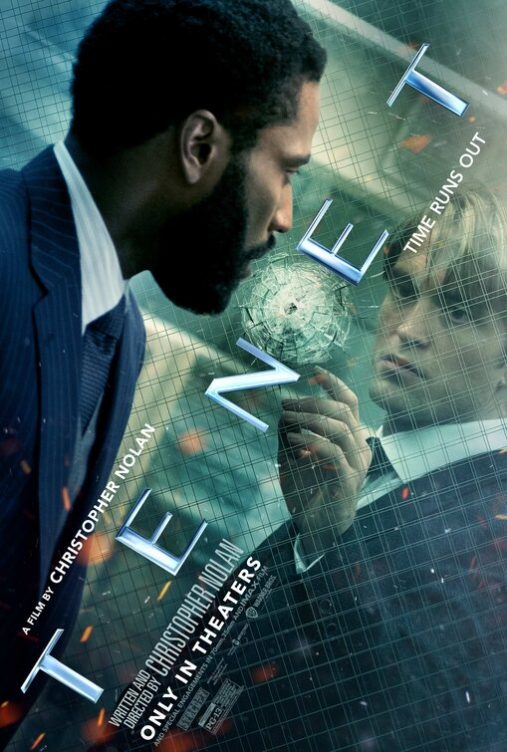
Christopher Nolan expertly manipulates your mind and reality while watching some of his films. When I first saw Memento, I had such a transformative experience that I became an unofficial recruiter and took all of my friends to see it as I logged additional showings for myself. I couldn’t imagine Nolan topping himself narratively, but he continued to do just that over the years by providing compelling journeys through the mind (Inception), space/time (Interstellar) and a crucial historical event (Dunkirk). You can’t watch these movies just once, and with each successive viewing, you observe the intricate visual cues and narrative hints that were there all along. Nolan’s latest spectacle set me up for another blown mind from the first trailer, and days later, I’m still thinking about the story and its events. Although a few slow spots and a lot of setup pepper the first hour or so, Tenet ultimately leaves you mentally and physically exhausted yet ready to go back(wards) into the theater to repeat the experience.
Out of respect for you, I’m not even going to attempt to explain the mechanism behind Tenet just as I wouldn’t give more than a hint at the mental machinations in Inception. The joy of the experience is truly in the discovery. From the official Web site, the description involves “something beyond real time. Not time travel. Inversion.” (Hey, maybe “Inversion” would have made a simpler title, but it would be too close to Inception and Tenet’s palindromic name actually represents the action better.) The most accurate way that I can categorize this cinematic trip would be as James Bond meets The Matrix with a touch of Back to the Future. Set fully in the action genre with science fiction trappings, Tenet introduces The Protagonist (John David Washington with an impressive beard), an operative who gets recruited to save the world from an impending World War III. He partners with another capable agent (Robert Pattinson), and they both investigate a corrupt oligarch (Kenneth Branagh with a passable accent) and try to liberate his abused wife (Elizabeth Debicki). The title represents both the operation and the code word that those in the know share with their compatriots.
Expect the careers to explode for both Washington and Debicki. I don’t remember seeing either before, yet I’m now a fan. Washington exhibits the cool demeanor of the best spies, yet he capably handles fighting and action sequences. Debicki exudes strength even in her vulnerable moments, and she offers balance to all of the craziness going on around her character. I prefer Branagh’s likable and heroic characters, but there’s nothing at all congenial about this villain. I recently heard about Pattinson taking over the cowl for the next round of Batman movies. His work here convinced me that he can turn into the dashing playboy Bruce Wayne who dons a mask by night. Agents in Tenet share the code phrase “We live in a twilight world,” which offers a humorous nod to Pattinson’s vampire past in the Twilight films. Look for three familiar actors to leave their mark on Tenet in just one scene apiece, including French actress Clémence Poésy as a scientist who starts The Protagonist on his journey down the rabbit hole.
My comparison to The Matrix hints at the main character’s eyes being opened to the world that he never saw around him, yet the types of hallmark action sequences of that series permeate Tenet as well. Two lengthy scenes involve vehicles on roads for extended periods of time, much like The Matrix Reloaded. Nolan smartly uses the colors red and blue at one point to make the action easier to follow, and if that’s not a red pill/blue pill reference, I don’t know what is. The car chase’s employment of the film’s central mystery makes your head spin as much as some of the cars. The opening sequence in an opera house reminds me of the bank robbery in The Dark Knight with its intensity and wide-open spaces. Tenet mixes it up so that you might have agents on bungee cords one minute and stunts with sailing yachts the next. When the action picks up, so does the music from Ludwig Göransson with staccato beats that sound like gunshots. Hand-to-hand combat in certain fight sequences feels weird because of what’s happening with the characters, and I would imagine that the fight coordinator never had to create those kinds of moves before.
I truly hope that Nolan breaks down the narrative threads on the eventual home release of the film. Storyboarding Tenet must have been a nightmare for all involved. The manipulations of time have plenty of clues, some of which you’ll catch on the fly and others that you’ll only realize later. Pay attention to bullets and the holes that they leave for some insight into the “science” behind the story. Many moviegoers embraced Nolan’s storytelling technique in Dunkirk with three narratives simultaneously advancing. Tenet takes that concept to another level with at least five threads moving along and affecting each other topped off by a race against time akin to the most intense scenes in Interstellar, Inception or Dunkirk. Perhaps one of Nolan’s best filmmaking techniques, Tenet benefits from the quick cuts and repeated glances at watches and timers.
Tenet emphasizes the real-world locations and impressive visuals like a field of wind turbines in the water and a battlefield that looks like something straight out of a video game. The best spy movies take you all over the world, and Tenet succeeds in generating that feeling. In the middle of a pandemic, you notice the characters in the film wearing masks perhaps more than before, and the threat of worldwide annihilation seems a bit too close to home. Every time that I think that Nolan can’t surprise me, he pulls off another miracle on screen. Find yourself a theater with great sound, and as one character advises, “Don’t try to question it. Feel it.”



